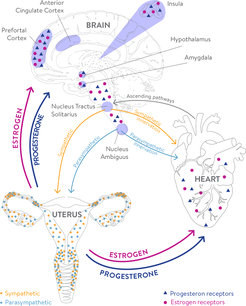How the menstrual cycle shapes heart and brain health
Did you know that a woman’s heartbeat subtly changes across her menstrual cycle? These rhythmic changes, driven by hormonal fluctuations, offer a unique window into the intricate connection between the female brain and heart. In a new Paper published in Science Advances, Max Planck researchers Jellina Prinsen, Julia Sacher and Arno Villringer outline how these naturally occurring variations might influence stress, mood, and long-term cardiovascular and neurological health.
For the more than two billion women worldwide who experience menstrual cycles, these insights could revolutionize clinical approaches to female cardiovascular and mental health. “Historically, medical research has centered primarily on male physiology. This has left critical gaps in our understanding of female-specific factors—like how the menstrual cycle may impact diagnosis and treatment.”, says Julia Sacher, research group leader in the Department of Neurology at MPI CBS, professor of cognitive neuroendocrinology at the Medical Faculty, University of Leipzig, and senior author of the paper.
Jellina Prinsen, first author of the paper, explains how the scientists outline various ways to push the field forward in their paper: “Consider, for example, these physiological variations in a women’s heart rate may have a significant impact on not only her stress levels or mood, but also long-term heart and brain health. Heart physiology, for women, isn't static, it ebbs and flows with their natural hormonal rhythms. Such fluctuations in cardiac activity may affect how quickly a woman is diagnosed when something is wrong, such as with an arrhythmia, which happen to occur more often in women. These complex cyclic interactions might also play a role in determining the right medication dosage and underscore the need for physicians to consider the menstrual cycle when assessing heart health and prescribing treatments. Ultimately, this knowledge will help pave the way for personalized medicine that adapts to a women’s natural hormonal rhythms.”

Bridging the Knowledge Gap
Recognizing the urgency and importance of the work, Jellina Prinsen has recently been awarded the prestigious Marie Skłodowska-Curie postdoctoral fellowship, enabling her to further expand their efforts. Together with Julia Sacher, the pair will continue pushing the boundaries and advocating for the integration of female-specific factors in studies on cardiovascular and neurological health, not only limited to menstrual cycle phases, but also considering pregnancy, perimenopause, and exogenous hormone use (e.g., contraception or gender-affirming care). The work will be carried out at the Leipzig Center for Female Health & Gender Medicine, Medical Faculty, University Medical Center Leipzig, the Max Planck Institute for Human Cognitive and Brain Sciences, and in collaboration with KU Leuven (Belgium).












